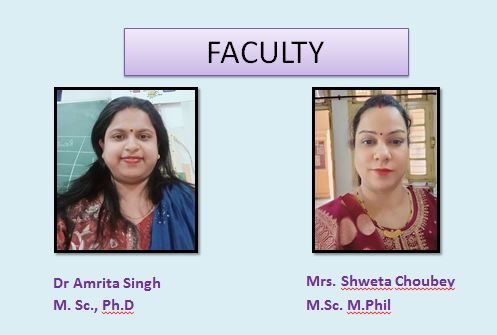Department of Biochemistry
Degree B Sc
Course Combination Biochemistry, Chemistry, Zoology
Parent Department Chemistry
Biochemistry was introduced at undergraduate level in 1994 – 95, with the initial financial assistance from UGC under the scheme of “vocationalization of courses at undergraduate level” Presently this course is run under the self-finance scheme.
Biochemistry is the Science Concerned with Chemical Nature & Chemical Behaviour of the Living Matter that is , the application of chemistry to the study of biological processes at the cellular and molecular level.
VISION
Understanding the Molecular Basis of Life:
- Improving Human Health:
- A major driving force is the application of biochemical knowledge to prevent and treat diseases. This includes:
- Developing new drugs and therapies.
- Understanding the molecular basis of diseases.
- Improving diagnostics.
- Personalized medicine.
- Advancing Biotechnology:
- Biochemistry plays a crucial role in biotechnology, with visions including:
- Developing sustainable solutions for energy production.
- Improving agricultural practices.
- Food security.
The vision of biochemistry is to use our understanding of the molecular world to improve the quality of life, advance scientific knowledge, and contribute to a sustainable future.
MISSION
- A fundamental mission is to elucidate the chemical processes that occur within living organisms. This involves studying the structure, function, and interactions of biomolecules like proteins, nucleic acids, carbohydrates, and lipids.
- Advancing Knowledge and Discovery:
- Biochemistry aims to drive scientific progress through research and discovery. This includes exploring the molecular mechanisms underlying biological processes, diseases, and potential therapeutic interventions.
- Education and Training:
- A crucial mission is to educate and train the next generation of biochemists, equipping them with the knowledge and skills necessary to contribute to research, healthcare, and other related fields.
In essence, the mission of biochemistry is to explore the molecular world of living organisms, to expand our understanding of life's processes, and to use that knowledge to improve human health and well-being.
Aims and objective
- Biochemistry is a fundamental science that seeks to understand the chemical processes within and related to living organisms
- A core objective is to elucidate the chemical structures and functions of biological molecules, including proteins, nucleic acids, carbohydrates, and lipids.
- Biochemistry aims to map and understand the complex network of chemical reactions that constitute metabolism.
- This includes studying how organisms acquire and utilize energy, synthesize essential molecules, and eliminate waste products.
- This involves studying DNA, RNA, and protein synthesis, as well as the regulation of gene expression.
- Biochemistry plays a crucial role in understanding the molecular basis of diseases.
- Biochemical principles are applied to develop biotechnological applications, such as genetic engineering and industrial enzyme production.
- In essence, biochemistry strives to bridge the gap between chemistry and biology, providing a molecular understanding of life processes.
Future plan
Gain hands-on experience in biochemical techniques such as PCR, chromatography, spectrophotometry, and protein purification.
Research Opportunities Join a research lab or work on independent projects related to drug discovery, enzyme kinetics, or metabolic pathways.
Research & Academia: Pursue a master’s or Ph.D. in biochemistry for careers in research institutions, universities, or biotech companies.
Medical Field Consider medical school, pharmacy school, or clinical research.
Environmental & Agricultural Biochemistry: Focus on sustainability, biofuels, or agricultural innovations.
Technical Skills: Master laboratory techniques, data analysis, and bioinformatics tools.
Communication: Learn to write research papers and present scientific findings effectively.
Faculty

Thrust Area of Curriculum
Theory Papers include A Detailed Study of
- Biomolecules
- Biophysical & Biochemical Techniques
- Enzymes
- Metabolism
- Nutritional Biochemistry
- Clinical Biochemistry
- Environmental Biochemistry
- Molecular Biology
- Recombinant DNA Technology
- Immunology
- Research Methedology
Laboratory Work includes the hand on practice of
- Qualitative Analysis of Biomolecules
- Quantitative Analysis Biomolcules
- Clinical Biochemistry
- Chromatography
- Enzymology
- Quantitative Analysis of RNA , DNA
- Physiological Analysis
- Techniques in Nutritional Biochemistry
Internship Programme
- Clinical Biochemistry by Working in
- Pathological Laboratories of Hospitals
- Pharmaceutical Laboratories
- Pesticide Formulation
- Food Formulation
- Food & Water testing Company
Laboratory of Biochemistry
The Department has a separate laboratory for Biochemistry practical. The laboratory has been upgraded with new instruments. The major instruments are mentioned here:
Blood Analyzer
Colorimeter
Pen pH Meter
pH Meter
Centrifuge Machine
Electrophoresis
Micropipettes
Various kits for testing
Glass Distillation
Variable volume Micro Pipettes
Library
Sufficient number of Text and Reference Books are available in the Library. every year new books are added as per the requirement.
Jobs directly related to Biochemistry
The students can enroll for master’s degree in Biochemistry after their graduation and can choose the career of their interest. Few jobs related to Biochemistry Degree are listed here;
- In Pharmaceutical, Nutrition & Food Industries as
- Biomedical scientist
- Clinical biochemist
- Clinical research associate
- Pharmacologist
- Patent examiner
- Water quality scientist
- Education
- Inspector of health and safety
- Occupational hygienist
- Scientific journalist
- Forensic scientist
